Walking through the streets of any southern Israeli neighborhood, the untrained eye could be led to believe that life there is no different to any other city or community in the country. In fact, one might need to be alerted to the pieces of infrastructure unique to a region which, for almost two decades, has endured the threat of rockets being fired from Gaza, compelling residents to run for cover.
In Kibbutz Alumim, less than three kilometers from the coastal enclave, Israel’s well-known air defense system, the Iron Dome, can be seen sitting up on a hill pointing towards the sky, in full view, as residents mosey through their neighborhood.
Meantime, underground, Israel’s military is building a defensive wall against Hamas attack tunnels.
Life in the Sha’ar HaNegev region is anything but ordinary.
A thin barbed wire fence is all that blocks the view from Israel into Gaza, where now a thick cloud of smoke is all but permanent since those Great March of Return protests began in 2016.
One could mistakenly believe an Israeli child had neglected their kite in the garden, looking at it laying torn and deteriorating in a family’s back yard. In reality, this is the remnant of an arson device flown over the border fence into Israeli territory from Gaza.
Join the fight for Israel’s fair coverage in the news
While the first Palestinian rocket was fired from Gaza in 2001, the launches have increased after Israel withdrew from the Strip in 2005.
Since the disengagement, more than 13,000 rockets and mortars have been fired at Israel.
In the most intense barrage, Palestinians fired more than 600 rockets in one weekend in May 2019.
So, who are the people living on Israel’s most active military front; where ordinary life goes hand in hand with conditions unimaginable to those in the West?
How do these residents contend with the reality of witnessing the carnage of the ongoing conflict up close?
“Normally I sleep through everything”
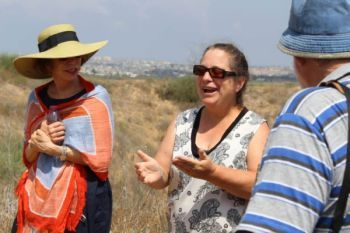
1:00 a.m. Monday: Noga Gulst, 53, is asleep in her bed.
She lives with her husband, Shem, in the Kibbutz Mefalsim located about 1.5 kilometres from Israel’s border with the Hamas-ruled Gaza Strip.
Mefalsim was quiet that night, until Israel’s Iron Dome defense system began shooting down rockets launched by terrorists from Gaza.
The sound of explosions are all too familiar to residents of the Sha’ar HaNegev region.
The safe room inside her modest home is not far from where Gulst ordinarily sleeps. A small home is, in fact, fortuitous for a family accustomed to dashing to safety. A mere few steps from her bedroom, through the kitchenette and living room, will take her to her son’s bedroom, which doubles as a bomb shelter. The bedroom window is fitted with shatter-proof glass and a metal blind which is swiftly shut when the code red alarm sounds, to seal off the area. Every home along the Gaza border is outfitted with a room that doubles as a bomb shelter. Entire families may sleep here, sometimes for nights on end, during flare-ups between Israel and Hamas when the rocket threat is even higher.
But since, this time, the chilling booms of the missile interceptions weren’t preceded by alert sirens, Gulst doesn’t run for shelter. Instead, she tucks herself in for a good night’s sleep. While risky, it was, after all, the fourth such incident in the past two weeks.
Meanwhile, a very different scene was unfolding at a festival in nearby Sderot. Sirens blared across the city, prompting 4,000 people attending an open-air concert to run for their lives.
Gulst, for her part, is soon jolted awake by the sound of larger explosions.
“Normally I sleep through everything. But this time, the bombing was so close to us, that I actually woke up from it,” she said, referring to the Israeli military’s retaliatory air strikes.
Gulst and her husband earlier the same week had a similar experience, bolting to their safe room to seek cover from incoming rocket fire.
“Hopefully the [incoming rocket threat alarm] application on the phone will give us half a second before the siren and we go into the safe room inside the house. We don’t take any chances. If we are told go to the safe room, we are there,” Gulst emphasized.
Residents say the chilling sound of red alert sirens are designed to give a 15-second warning before a rocket is set to strike, although that may be a generous estimation. Gulst says the true timing is closer to 10 seconds.
“Whenever we go outside of the house, even when the siren doesn’t go off, the first thing I’ll do is check where the closest bunker is… so if the alarm goes off, I know where to go.”
This has become routine for the Israelis who live on the front lines of the conflict with Gaza’s rulers. But it’s a situation that Gulst says never gets easier.
“It’s fear for life. There’s no other way to say it.”
Gulst has for five decades lived in the Sha’ar HaNegev region, where she raised her two children, both of whom have now moved to other Israeli cities.
“They love the area, they would love to stay here, but both of them are traumatized and the only way that they can continue and try to live a normal life is to do it outside of the area.”
Despite the rocket threat, Gulst is content with her decision to build a life in Israel’s volatile south.
“It’s not something that you do very easily and we are here because we decided to stay. Someone needs to stay here. It’s in Israel. It’s even in the borders of ’67. There’s no argument that this is part of Israel. So, for us, this is life.”
Gulst, like many other civilians here, remembers a time when Israelis and Palestinians lived and worked together in Gaza; a situation she hopes will one day again materialize.
“It’s important to understand that we live here with the hope for peace, with the hope for change, with the hope that something will change in both [the Israeli and Palestinian] governments.” The problem, she continued, “is that when we left Gaza [in 2005] it was one sided. We have to do something that will change the equation of the fight; they’re shooting at us and we’re shooting back. They say ‘oh, you killed a person here so, let’s shoot at you.’ We need to change that [cycle].”
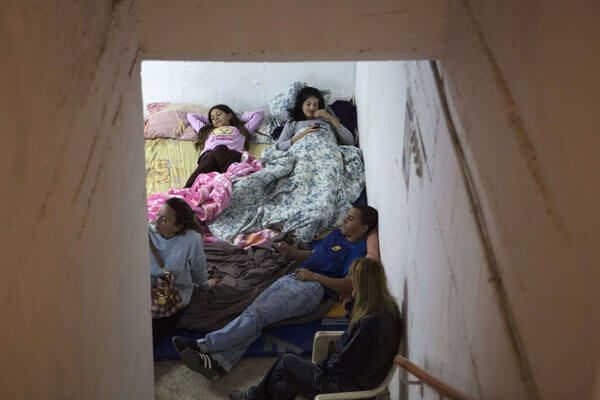
In order for things to change, Gulst said with a heavy heart, another large scale military operation will need to be carried out.
“Although [Gazans] are the underdogs, we are coming in less powerful than we should,” she contended. “If they were afraid of us, they wouldn’t shoot…. 5 to 10 missiles [at Israel weekly] and [the Israeli government would not] allow them to accept 15 million dollars [monthly in Qatari handouts]. So for them, every time they want money, they’ll shoot at us.”
In this respect, Gulst suggested that the ongoing “March of Return” Palestinian protests along the shared border were a sign of desperation.
“I think firstly, the people in Gaza are frightened of Hamas and [secondly] they see that the way to get paid and to get salaries and to get money is to work with Hamas,” Gulst laments.
Despite the violence, she believes that more needs to be done to improve the quality of life in Gaza, so as to empower its citizens.
Regarding the blockade on the Strip, Gulst assumes a more nuanced approach.
“Egypt is blockading more than [Israel], so why are they not against Egypt and just us?
Egypt can open [its borders] and let [the Palestinians] go freely back and forth. [Israel is already providing] solar [energy] and gasoline and they shoot at the truck driver that brings [it] and then we are to blame that [the citizens of Gaza] are not getting any [fuel].”
Related reading: The Gaza Blockade: An Explainer
Gulst believes the reality of the conflict is misrepresented.
“There are two sides to the picture and we are trying to do our best, but a picture of a child killed in Gaza is easier to sell than a child sitting in a safe room in Sha’ar HaNegev.”
When it comes to the threat of living under sporadic rocket fire, Gulst believes her life is at higher risk driving on Israeli roads.
“’We always say it’s [bad] maybe five per cent of the time. Most of the time, it’s good,” Gulst says, while providing a caveat.
“What I want is that 100 percent of the time it will be good in Gaza and it will also be good here. But they [Hamas] want that 100 percent of the time it will be bad here and they don’t really care for [their own citizens]. They care for the fight.”
Turning shrapnel into necklaces
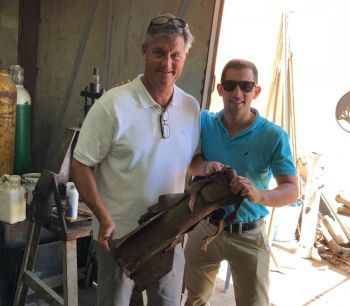
9:00 p.m. Sunday: Yedidya Harush, 31, is at the Sderot festival and witnesses the chaos unfold, which he described as “insane.”
The Qassam rocket threat has caused post-traumatic stress disorder in both children and adults. One-third of Sderot’s youth reportedly suffer from PTSD.
“When you are by yourself and you hear the red alert [siren], you just run and take cover inside a bomb shelter, next to a wall, underneath something. You feel some kind of a secure feeling, even though sometimes the object you’re hiding under might not be so safe. But when everybody sees such big crowds they [fear] that there is no place to really hide.”
Harush is a former Gaza resident, who was forced to abandon his home in Gush Katif along with nearly 10,000 other Israeli civilians when then-prime minister Ariel Sharon, in 2005, unilaterally withdrew from the territory.
Over 20 communities were uprooted, synagogues were left behind, schools and businesses were shuttered.
One year prior, Harush’s pregnant cousin, Tali Hatuel, 34, and her four young children were shot dead by Palestinians while traveling on a road leading to Gush Katif.
“When we [disengaged from Gaza] we thought there will be peace. It was an act of peace. And peace did not come. Only the opposite happened,” Harush says.
“It’s a shame and I feel bad to see [what’s become of the] place where I grew up. It was a jewel. I think the opportunity to grow and build the Gaza Strip is enormous… and I do, I feel bad to see how Hamas treats their people.”
Some of the once flourishing Israeli communities are now Hamas launching pads.
Harush is now raising his young daughters in the community of Shlomit, located about five kilometers away from the frontier. He chose to remain in the South out of a deep sense of purpose.
“It’s not like every day there are rockets. It’s once every few weeks. Yes, it’s not pleasant. It’s not normal to have rockets flying towards you,” he says. “But hey, let’s look at our lives from a historical perspective… we are living in our own homeland after 2,000 years of dreaming about it and we are able to protect ourselves. And ‘never again,’ from the Holocaust can only be a reality if we have our own homeland and army.”
Harush considers himself fortunate to be living on the front lines and believes his children will grow up to be better people because of his example.
“We are doing good and even though they throw rockets, we are not going to hate the other side. We are not going to talk about the other side badly. If we put our energy towards hate and negativity it wouldn’t take us anywhere,” Harush explains.
Instead, he and his wife Shiran collect shrapnel from Qassam rockets fired at Israel and turn them into necklaces.
The delicate pieces which have been melded into the form of love hearts, the Star of David and perhaps the most complex, the State of Israel, are a far cry from the aggressive and bulky chunks of shrapnel from which they came.
“The point is to do something that is good and beautiful, to show that there is still hope in our world. We take the worst thing and make it into this gorgeous piece of jewelry,” Harush says. After one of his friend’s homes in Sderot suffered a direct hit from a rocket, Harush collected the heavy pieces of steel and began creating from the destruction. “Our prayer is that one day we will run out of materials,” he says.
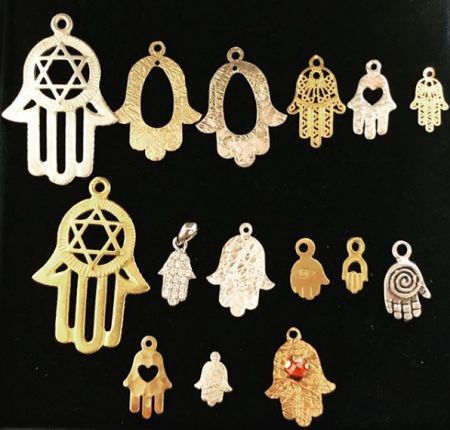
Until such time, Harush remains baffled that the Palestinians have repeatedly rejected Israeli peace overtures and instead continue to pursue violence.
“If we opened the borders of Gaza, we would be murdered! And who is the controlling body in Gaza? It’s Hamas. During [Operation Protective Edge, the 50-day war with Hamas in 2014], Israel was letting aid into Gaza from the {Kerem] Shalom and Erez crossings. You know, [Palestinians] were firing rockets at the crossings and they killed Israelis. They were firing rockets at the crossing!” Harush emphasized. “They fired rockets at the Ashkelon power plant! This is the power plant that supplies them with electricity. You know, these are things that don’t make sense.”
Harush believes that Israel could do more to alleviate the humanitarian crisis in Gaza that began when Hamas was elected to power in 2007, but only if Israel’s security is guaranteed. His qualm for now, is that other countries aren’t doing enough to pick up the slack.
“Look at what Egypt and other countries do for [the Gazans] and then look at what Israel does for them, while these are our enemies,” Harush noted, invoking the peculiar fact that the daughter of Hamas chief Ismail Haniyeh underwent treatment in a Tel Aviv hospital just weeks after the 2014 conflict.
Related reading: Focus on Hamas: A Brutal Terror Organization
Accordingly, Harush believes the anger of the Gazan population is misdirected.
“If their leadership was willing to do everything for them, was willing to give them welfare, willing to help sick people, was putting all the billions of dollars that they get… and really give it to the people because that’s where it’s really meant to be, and not go and build another tunnel or another rocket to kill other innocent people, then believe me, life would be a lot better for them. This is their government, not mine,” he asserts.
“When I pay too much tax, I don’t go and cry to the Palestinian government or the Jordanian government. I go to my own government. When I was kicked out of my home, I thought it was the stupidest idea… I pointed the finger at Ariel Sharon and said, you’re the one to blame. I blamed my prime minister.”
“Why should I move?”
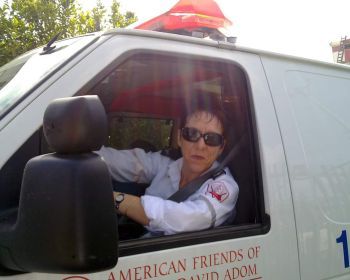
9:45 p.m. Sunday: Beverly Jamil, 56, is at a local hospital on the night of the Sderot festival attack. She is a volunteer medic for Israel’s ambulance service.
“I saw people who came in and they were traumatized. Children, babies, parents, grandparents,” she recalls.
It has been only a few weeks since Jamil’s mother-in-law was killed by injuries sustained while running to a bomb shelter.
Jamil lives in Ashkelon, some 13 kilometers from the Gaza border. She moved there in 1982 from Manchester, UK. Because of the rocket threat, life in the city, where she raises twin daughters, has undergone a “180 degree switch” from when she first arrived at 18 years old, Jamil says.
“I feel like I’m a target. I always say when you go to these fairs and you have to shoot the ducks down to get a prize, well we are ducks. We are sitting ducks. Will the rocket come here? Is this a threat to us? Will Iron Dome intercept it? Even the Iron Dome is [not perfect], because [the shrapnel has] got to fall somewhere.”
Jamil remembers her first date with who is now her husband, Reuven. They went to Gaza.
“I wish I could go back to ’83. There was an open border and you used to go through and you used to sit there and do your shopping and come home and do you know what? You used to feel safe there,” Jamil waxed nostalgically.
While she acknowledges the panic and resulting trauma during an uptick in violence between Israel and Hamas, Jamil insists she would never leave Ashkelon.
“It’s my home. Why should I move? This is where my family is. This is where my children grew up,” she asserts. “I’m very patriotic. I love my country. Do I feel safe here? Yes. When the [alert siren] goes off, you go into a different mode. Listen, we’ve been having it for 10 years.”
Jamil refers to the safe room in her home as “the mad,” an abbreviated version of the Hebrew word for shelter, mamad. Her use of the slang word in a certain way highlights the regularity with which it has been used. In fact, the safe room in her apartment is also the bedroom of one of her 21 year old daughters. This, she explains, is due to the fact that she lives in a newer neighborhood, constructed in the past two decades. In this way, Jamil feels she is lucky. The older neighborhoods, she explains, have a communal shelter on the ground floor of the apartment buildings.
“When we have ‘Tzeva Adom’ [rocket threat sirens] you can’t reach them in time, so basically, you go into your staircase and pray,” she sighs. “In my first apartment where we had the communal shelters, the only time we had sirens was during the Iraqi war and then we went into rooms that were blocked off with plastic and towels, because we thought it was going to be chemical warfare.”
Related reading: Terror Victims: Every Day is Remembrance Day
Some parts of Ashkelon, however, are particularly vulnerable during upticks in violence.
“The oldest neighborhoods have the shelters that are scattered around the streets,” Jamil states.
Jamil says that while she has always been concerned for her family’s safety, people can cope with the flare-ups so long as one is prepared and knows how to react.
“[My kids are] not traumatized by the rockets because me and my husband try to convey that as long as you get to the safe room, as long as you follow what you’ve been told to do, then hopefully you should be okay. If you’re in the car, get out of the car and lie on the ground with your hands over your head,” she casually instructs.
“I hope that one day we won’t be running from rockets. I’d like my children to get married and have families and know they [don’t have to be] worried about [whether] there [are] going to be rockets and go through the same drills that I’ve drilled into them.”
Liked this article? Follow HonestReporting on Twitter, Facebook, Instagram and TikTok to see even more posts and videos debunking news bias and smears, as well as other content explaining what’s really going on in Israel and the region.
Before you comment on this article, please note our Comments Policy. Any comments deemed to be in breach of the policy will be removed at the editor’s discretion.


